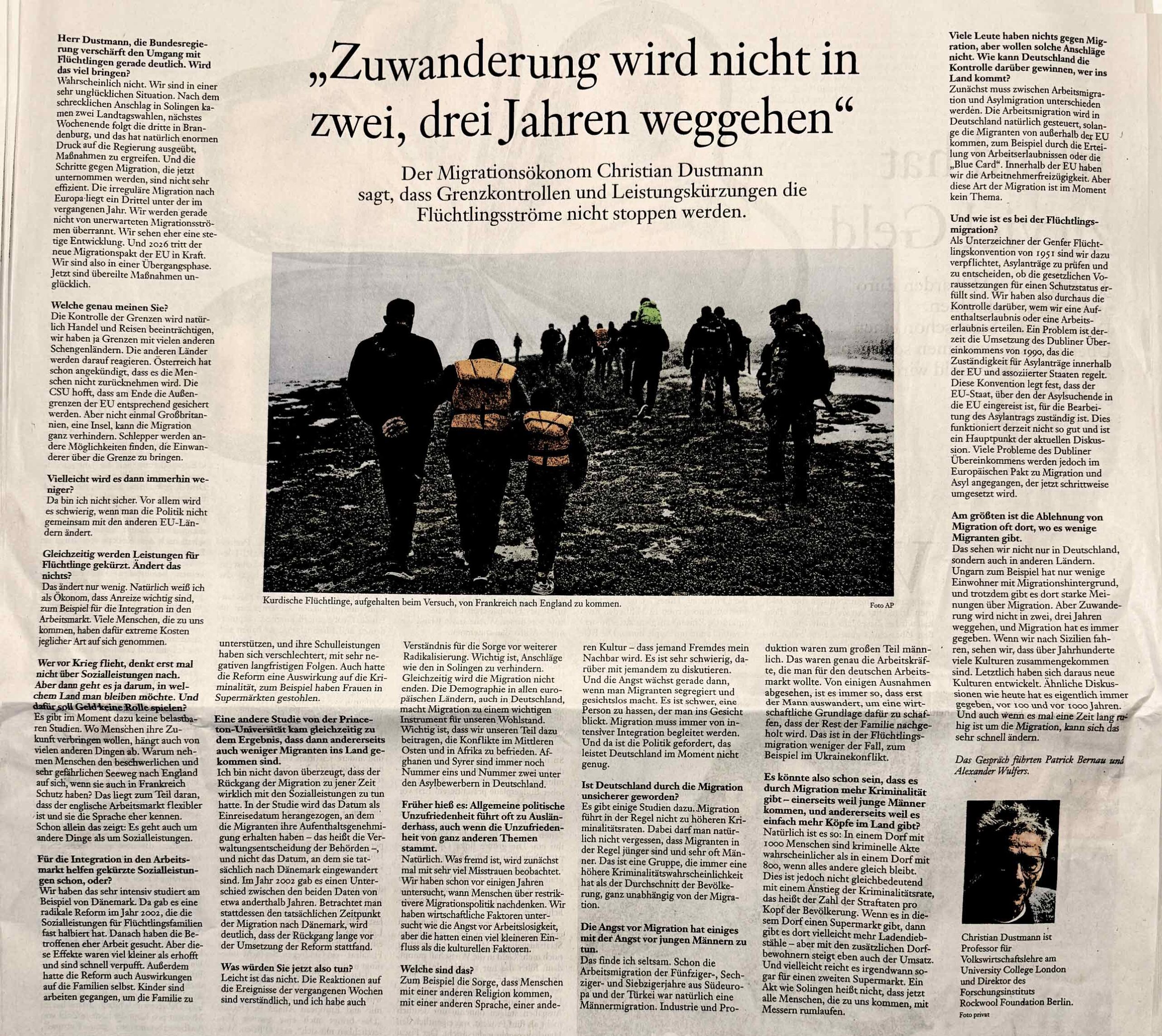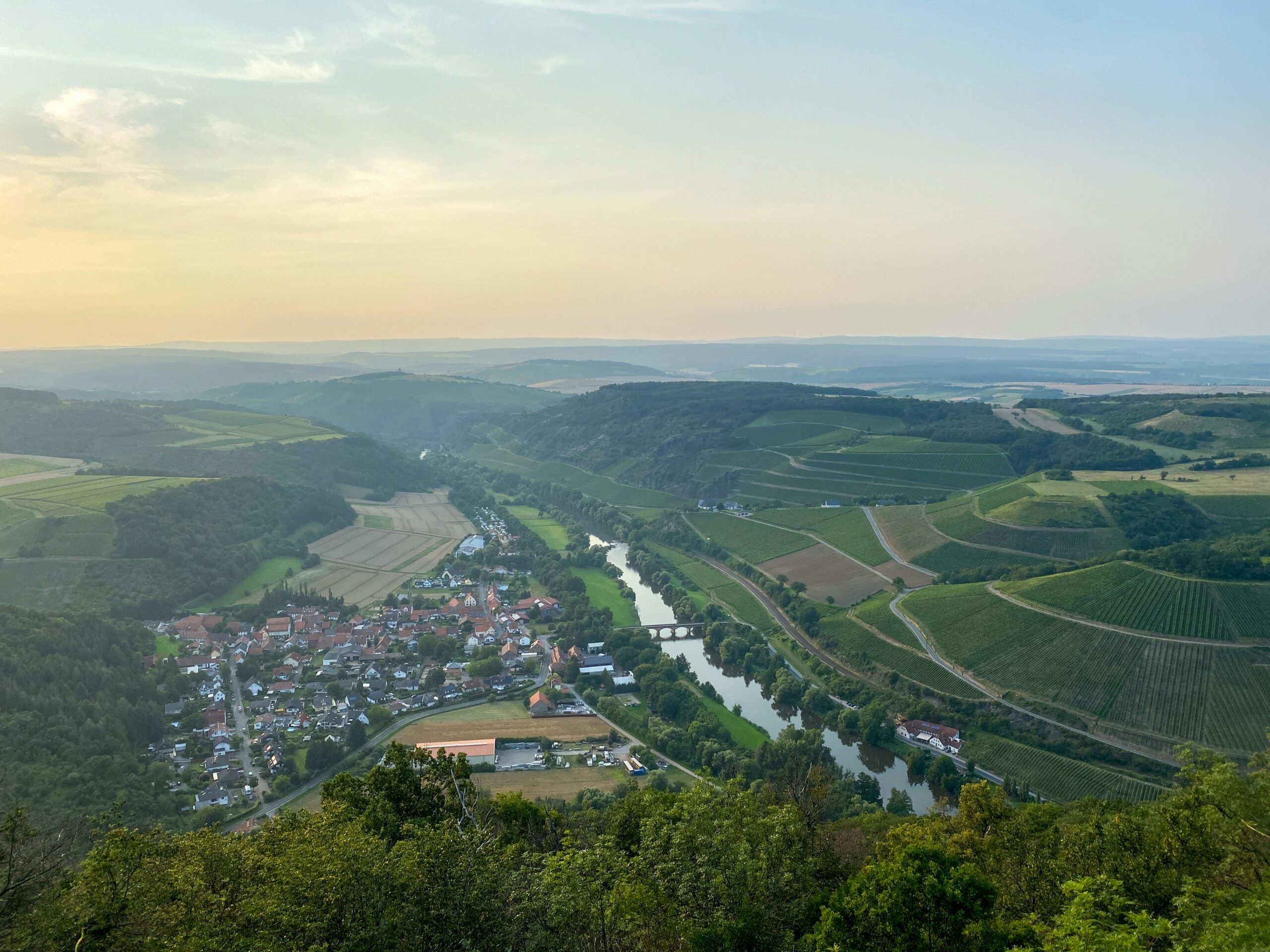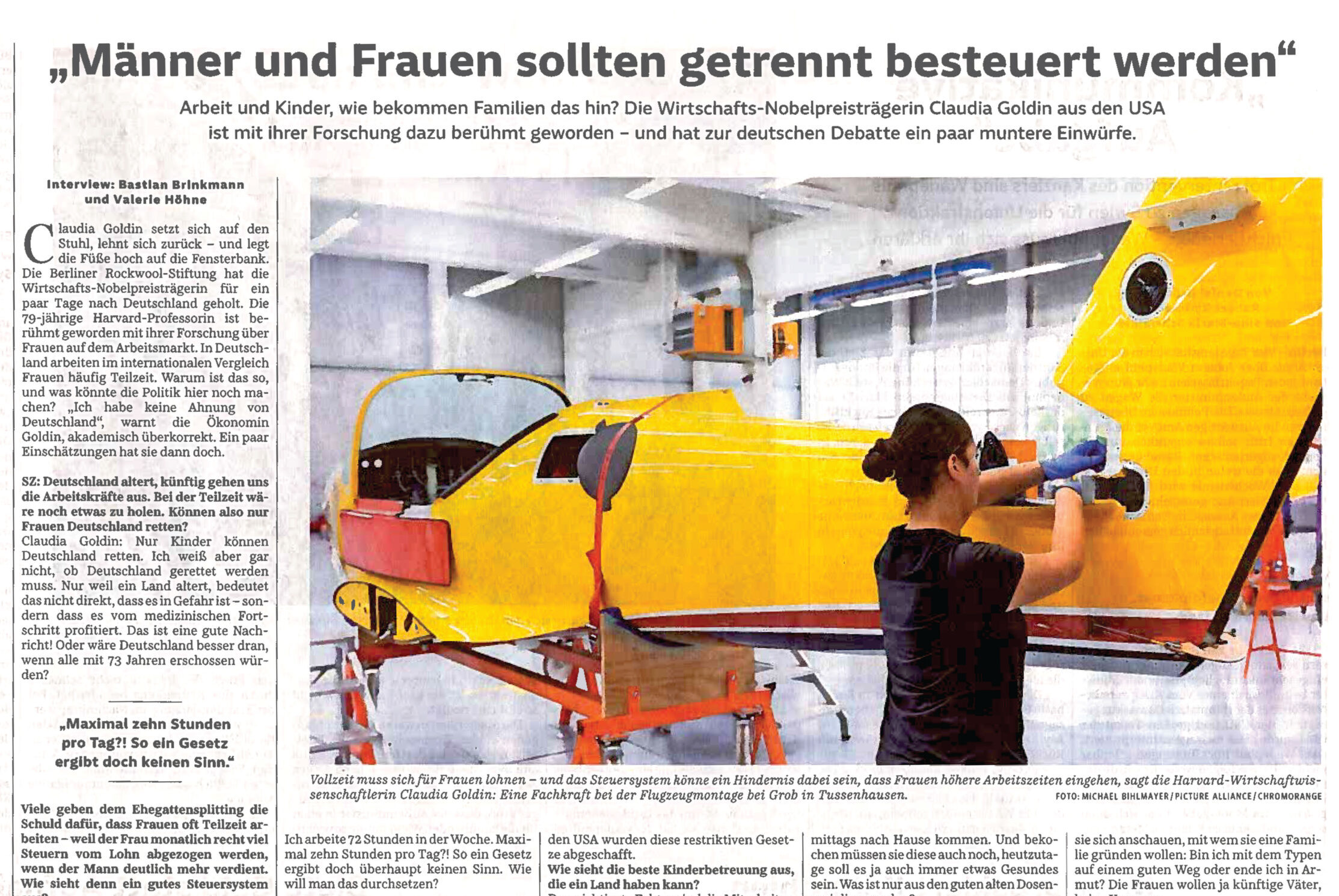Frankfurter Allgemeine Zeitung Sonntagszeitung (FAS) recently published an extensive interview with our Director, Christian Dustmann, in which he explores the complexities of current migration policies in Germany and Europe. The interview, conducted by journalists Patrick Bernau and Alexander Wulfers, dives deep into the evolving landscape of migration, the inefficacy of recent government measures, and the future role of migration in shaping European prosperity.
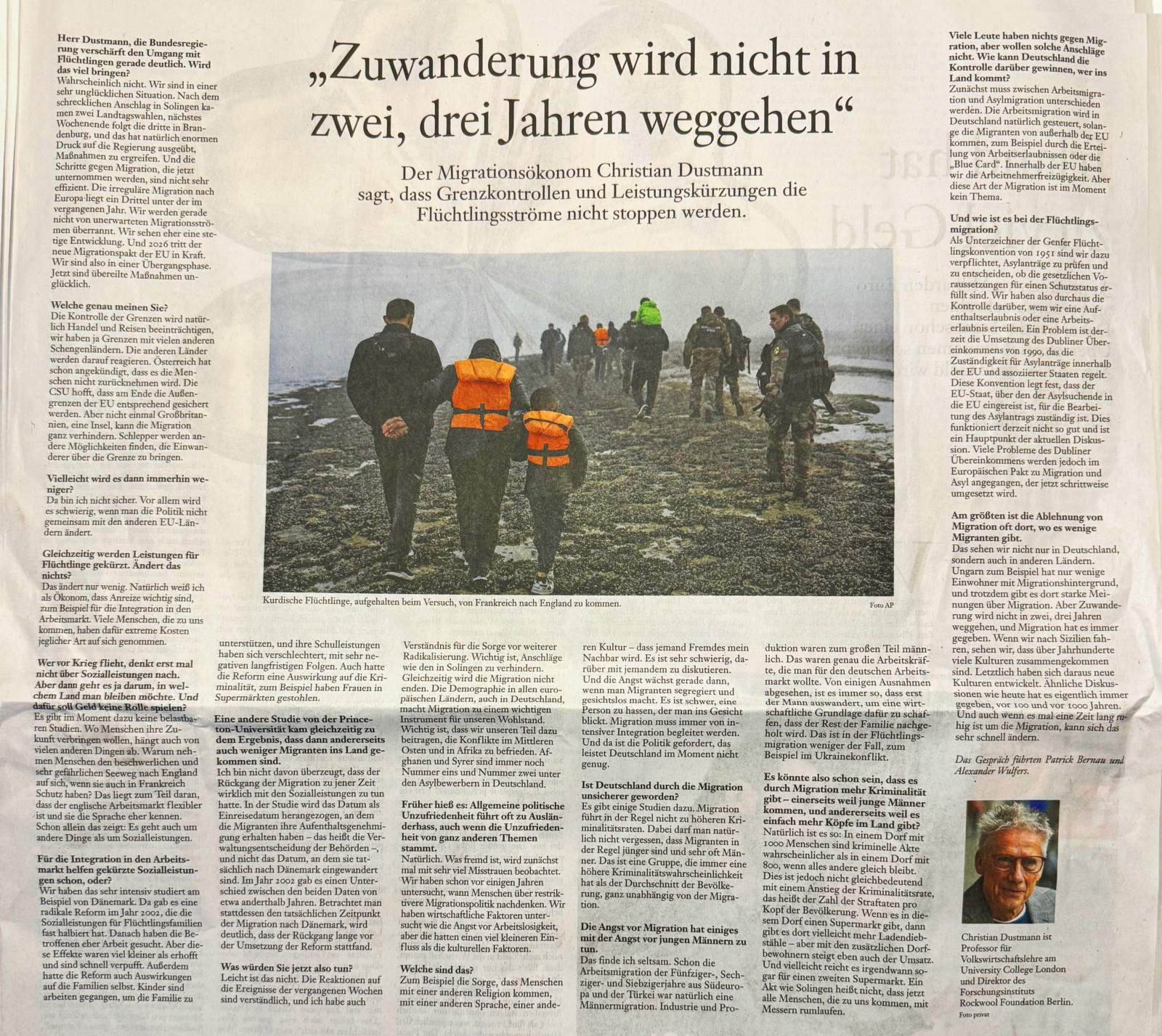
In the conversation, Professor Dustmann highlights the limitations of tightening border controls and cutting social benefits as means to curb migration. He underscores the demographic realities driving migration and the necessity of long-term, coordinated European policy solutions, such as the upcoming EU Migration Pact in 2026. Throughout the interview, he provides a nuanced perspective on labor migration, refugee flows, and the socio-economic challenges these movements present.
For the complete article, please visit the publisher’s website. The English version of the interview is provided below.
Immigration will not go away in two or three years
Mr. Dustmann, the federal government is tightening its approach to dealing with refugees. Will that help much?
Probably not. We are in a very unfortunate situation. After the horrific attack in Solingen, there were two state elections, and next weekend will be the third one in Brandenburg. This, of course, has put enormous pressure on the government to take measures. The steps being taken now against migration are not very efficient. Irregular migration to Europe is down by a third compared to last year. We are not being overrun by unexpected migration flows. We are seeing more of a steady development. And in 2026, the new EU Migration Pact will come into force. We are, therefore, in a transition phase. Right now, hasty measures are unfortunate.
Which measures exactly do you mean?
Border control will naturally affect trade and travel; after all, we share borders with many other Schengen countries. The other countries will react to this. Austria has already announced that it will not take people back. The CSU (Christian Social Union) hopes that in the end, the EU’s external borders will be secured accordingly. But not even the UK, an island, can completely prevent migration. Smugglers will find other ways to bring immigrants across the border.
Maybe there will be fewer immigrants then?
I’m not so sure. It will be difficult, especially if the policy is not changed in coordination with the other EU countries.
At the same time, benefits for refugees are being cut. Won’t that change anything?
That will change very little. Of course, as an economist, I know that incentives are important, for example, for integration into the labor market. Many people who come to us have incurred extreme costs of all kinds to get here.
People fleeing war don’t think about social benefits first. But then it comes down to which country they want to stay in. And should money not play a role in that?
At the moment, there are no reliable studies on this. Where people want to settle also depends on many other factors. Why do people take the arduous and very dangerous sea route to England when they could also seek protection in France? This is partly because the English labor market is more flexible, and they are more familiar with the language. That alone shows: it’s about more than just social benefits.
Do cuts in social benefits help with labor market integration?
We studied this very intensively using the example of Denmark. There was a radical reform in 2002, which nearly halved the social benefits for refugee families. As a result, the affected people started seeking work more. But these effects were much smaller than expected and quickly wore off. Furthermore, the reform had impacts on the families themselves. Children started working to support their families, and their school performance deteriorated, with very negative consequences. The reform also had an impact on crime, for example, women stealing from supermarkets.
Another study from Princeton University came to the conclusion that fewer migrants came to the country as a result.
I’m not convinced that the decline in migration at that time had anything to do with social benefits. In the study, the entry date is taken as the date when migrants received their residence permit — that is, the administrative decision by the authorities — not the date when they actually migrated to Denmark. In 2002, there was a difference of about a year and a half between the two dates. When you look at the actual time of migration to Denmark, it becomes clear that the decline occurred long before the reform was implemented.
What would you do now?
That’s not easy. The reactions to the events of the past weeks are understandable, and I also understand the concern about preventing further violence like that in Solingen. At the same time, migration will not stop. Demographics in all European countries, including Germany, make migration an important instrument for our prosperity. It’s crucial that we contribute to pacifying conflicts in the Middle East and Africa. Afghans and Syrians are still the top two groups among asylum seekers in Germany.
It used to be said: general political dissatisfaction often led to xenophobia, even if the dissatisfaction stemmed from entirely different issues.
Naturally. What is foreign is initially viewed with great suspicion. A few years ago, we studied when people start thinking about more restrictive migration policies. We examined economic factors such as the fear of unemployment, but these had a much smaller influence than cultural factors.
What are those?
For example, the concern that people with a different religion, a different language, or a different culture will become my neighbors. It’s very difficult to discuss this with someone. And fear grows particularly when migrants are segregated and faceless. It’s hard to hate someone you look in the face. Migration must always be accompanied by intensive integration. And this is where politics has a role to play — right now, Germany is not doing enough.
Has Germany become less safe because of migration?
There are some studies on this. Migration generally does not lead to higher crime rates. However, one must not forget that migrants are typically younger and often male. This is a group that always has a higher probability of criminality than the average population, regardless of migration.
The fear of migration has quite a lot to do with the fear of young men.
I find that strange. Even the labor migration of the 1950s, 60s, and 70s from southern Europe and Turkey was largely male. Industry and production were predominantly male. Those were exactly the workers that were wanted for the German labor market. Aside from a few exceptions, it has always been the case that the man migrates first to create an economic foundation for the rest of the family to follow. This is less the case in refugee migration, for example, in the Ukraine conflict.
So, could there be more crime due to migration — on the one hand, because young men are coming, and on the other hand, simply because there are more people in the country?
Of course, in a village with 1,000 people, there are more likely to be criminal acts than in a village with 800, if everything else remains the same. But this does not mean that the crime rate — the number of crimes per capita — will increase. If that village has a supermarket, there might be more shoplifting, but with the additional residents, the store’s revenue will also increase. And maybe it will even be enough for a second supermarket at some point. An act like Solingen does not mean that now everyone who comes to us is walking around with knives.
Many people have nothing against migration but don’t want such attacks. How can Germany gain control over who comes into the country?
First, a distinction must be made between labor migration and asylum migration. Labor migration in Germany is naturally regulated, as long as the migrants come from outside the EU, for example, through work permits or the “Blue Card.” Within the EU, we have the freedom of movement for workers. But this type of migration is not an issue at the moment.
What about refugee migration?
As a signatory to the 1951 Geneva Convention on Refugees, we are obligated to examine asylum applications and decide whether the legal requirements for protection status are met. We do, therefore, have control over who we grant residence or work permits to. One problem at the moment is the implementation of the 1990 Dublin Agreement, which regulates responsibility for asylum applications within the EU and associated states. This convention stipulates that the EU country through which the asylum seeker entered the EU is responsible for processing the asylum application. This is not working well at the moment and is a key point in the current discussions. Many problems of the Dublin Agreement are being addressed in the European Pact on Migration and Asylum, which is now being implemented step by step.
The greatest rejection of migration is often found in places where there are few migrants.
We see this not only in Germany but also in other countries. Hungary, for example, has very few residents with a migration background, yet there are strong opinions on migration. But immigration will not go away in two or three years, and migration has always existed. If we go to Sicily, we see that over centuries many cultures have come together there. Ultimately, new cultures emerged from this. Similar discussions have always existed, 100 years ago and 1,000 years ago. And even when migration is quiet for a while, it can change very quickly.
The conversation was conducted by Patrick Bernau and Alexander Wulfers.
Christian Dustmann is a professor of economics at University College London and director of the ROCKWOOL Foundation Berlin research institute.
